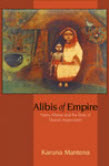Karuna Mantena and Timothy Snyder Awarded International Book Prize by The MacMillan Center
October 27, 2011. New Haven, CT — Karuna Mantena, Assistant Professor of Political Science, was awarded the Gaddis Smith International Book Prize for best first book for Alibis of Empire (Princeton University Press, 2010).
Timothy Snyder, Professor of History, was awarded the Gustav Ranis International Book Prize for best book for Bloodlands: Europe Between Hitler and Stalin (Basic Books, 2010). Established in 2004 to recognize the distinguished legacy of two former Directors of the MacMillan Center, the prizes are awarded for books on international topics written by current members of the Yale faculty. Award recipients receive a research appointment at the MacMillan Center, and a $10,000 research award over two years.
 In recent years, post-colonial scholarship has increasingly emphasized the link between liberalism and empire. In Alibis of Empire, Karuna Mantena complicates the equation, showing how the Sepoy Rebellion (1857) severed the link, leading the British to abandon direct rule and liberal universalism and move towards a policy of indirect rule premised on a theory of cultural difference. The intellectual progenitor of this new approach, she shows, was none other than Henry Maine, the comparative legal scholar best known for the characterizing the transition to modernity as a shift from “status” to “contract.” In a startling conclusion, Mantena suggests that America’s imperial misadventure in Iraq eventuated in a parallel process of disillusion and rethinking.
In recent years, post-colonial scholarship has increasingly emphasized the link between liberalism and empire. In Alibis of Empire, Karuna Mantena complicates the equation, showing how the Sepoy Rebellion (1857) severed the link, leading the British to abandon direct rule and liberal universalism and move towards a policy of indirect rule premised on a theory of cultural difference. The intellectual progenitor of this new approach, she shows, was none other than Henry Maine, the comparative legal scholar best known for the characterizing the transition to modernity as a shift from “status” to “contract.” In a startling conclusion, Mantena suggests that America’s imperial misadventure in Iraq eventuated in a parallel process of disillusion and rethinking.
 Bloodlands is an ambitious work of historical synthesis. Snyder compels the non-specialist to rethink most everything she knows about mass killing in World War II: when it happened, where it happened, how it happened and to whom it happened. Drawing on recent work by specialists as well as on his original research in newly opened archives, Snyder shifts the chronology backwards to the Ukrainian famine of 1933, eastwards to the “Bloodlands” between Hitler’s Germany and Stalin’s Russia, away from the concentration camps to the open spaces where most of the killing occurred and towards forgotten victims, such as the Japanese POWs who labored in the Russian Gulag, or the Polish elites murdered by Hitler’s Einsatzgruppen. And by combining the staggering statistics of the death toll with poignant anecdotes about individual victims, he helps us to grasp the immensity of the historical crimes.
Bloodlands is an ambitious work of historical synthesis. Snyder compels the non-specialist to rethink most everything she knows about mass killing in World War II: when it happened, where it happened, how it happened and to whom it happened. Drawing on recent work by specialists as well as on his original research in newly opened archives, Snyder shifts the chronology backwards to the Ukrainian famine of 1933, eastwards to the “Bloodlands” between Hitler’s Germany and Stalin’s Russia, away from the concentration camps to the open spaces where most of the killing occurred and towards forgotten victims, such as the Japanese POWs who labored in the Russian Gulag, or the Polish elites murdered by Hitler’s Einsatzgruppen. And by combining the staggering statistics of the death toll with poignant anecdotes about individual victims, he helps us to grasp the immensity of the historical crimes.
Contact Information:
Marilyn Wilkes
The Whitney and Betty MacMillan Center for International and Area Studies at Yale
(203) 432-3413